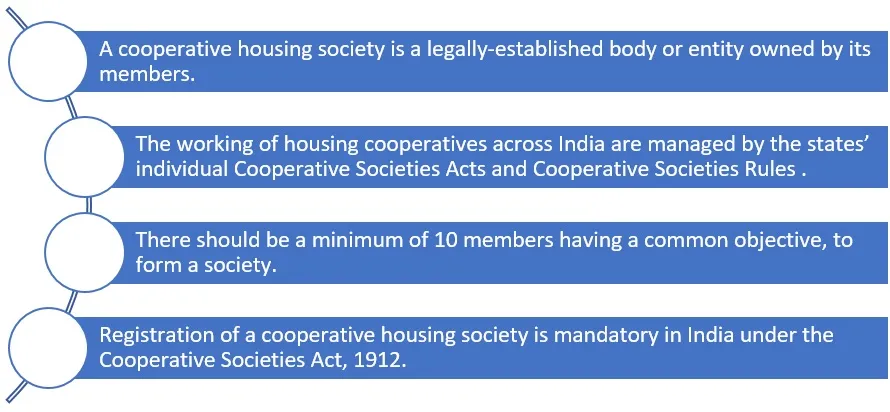Everything You Need to Know About Cooperative Housing Societies
Cooperative housing societies have been a cornerstone of affordable housing in India for many decades. These self-regulated entities, governed by their members, play a crucial role in providing affordable housing solutions to millions. Formed through mutual cooperation and consent, cooperative housing societies offer numerous benefits to their members. In this article, we will delve into the intricacies of cooperative housing societies, their objectives, characteristics, types, and the advantages of investing in one.
What is a Cooperative Housing Society?
A cooperative housing society is a legally-established entity owned by its members or residents to meet their common housing needs. The society owns and manages properties consisting of one or more residential structures. It purchases land, develops it, constructs flats, and allots them to its members. The functioning of housing cooperative societies in various states across India is managed by individual Cooperative Societies Acts and rules regulated by the Registrar of Cooperative Societies, entrusted by the government. Most cooperative societies are part of the National Cooperative Housing Federation of India (NCHFI) and adhere to the model bye-laws under the Multi-State Cooperative Societies Act, 2002.

Objectives of a Housing Cooperative Society
The primary objective of a housing cooperative society is to support its members. Here are some other key objectives:
- Providing Loans: Offering loans for the construction of houses or additional structures within the complex.
- Acquiring Land: Purchasing land, constructing flats, and distributing them among the members.
- Promoting Economic Interests: Encouraging self-reliance and promoting the economic interests of the housing society.
- Facilitating Healthy Living Standards: Creating an ideal socio-economic environment within the housing society.
- Basic Facilities: Ensuring the supply of basic facilities like water and electricity and regular maintenance of the housing society.
Characteristics of a Cooperative Housing Society
Voluntary Organization
Housing cooperative societies are voluntary organizations based on the principles of self-reliance and self-help.
Open Membership
Membership is open to all individuals with common interests.
Autonomy and Independence
Housing cooperatives operate autonomously and independently in many aspects.
Democratic Leadership
Office bearers or representatives are selected through a fair election process.
Separate Legal Entity
A cooperative society is registered under the Cooperative Societies Act, making it a legal entity subject to local and national laws.
Financial Contribution
Every member makes an equal financial contribution to purchase and maintain common properties.
Limited Liability
Expenses are shared equally to the extent of each member’s contribution.
Member Benefits
Welfare, convenience, and prosperity are top priorities for all members, without self-interest and power play.
Training and Information
Housing cooperative societies provide training and knowledge about legal compliance, management, and community living benefits.
Mutual Help
Members support each other to follow best practices and improve living standards through local, national, and international structures.
History of Cooperative Housing Societies in India
The cooperative housing society movement in India gained momentum in the early 20th century. The Bangalore Building Cooperative Society, established in 1909, was the first cooperative housing society in Karnataka. This was followed by the Bombay Cooperative Housing Association in 1913 in Maharashtra, which created the first-ever model bye-laws and steered the growth of cooperative housing.
The National Cooperative Housing Federation was established in 1969 to support housing societies in obtaining funds and general insurance, conducting research, and assisting state-level Cooperative Housing Federations. Over the years, several state and central-level schemes have been introduced to provide loans and land development assistance to housing societies. The government has also made numerous amendments to cooperative housing laws to make them more favorable for small and medium housing societies.
Types of Housing Cooperatives
Tenant Ownership Housing Societies
In this type, the land is held either on a leasehold or freehold basis by the society. Members own the houses and lease the land. They must adhere to regulations for subletting and transferring the houses but can construct their homes as per their needs.
Tenant Co-partnership Housing Societies
Here, the cooperative society holds the land and building on a leasehold or freehold basis. Members get an occupancy right after paying an initial share and a monthly rent.
Housing Mortgage Societies
These societies function like credit societies, lending money to members for constructing houses. However, members are responsible for arranging the construction work.
House Construction or House Building Societies
In this category, the housing cooperative society constructs houses on behalf of its members. After construction, the houses are handed over to the members, and the construction costs are recovered as loans.
How to Form a Cooperative Housing Society
Most cooperative societies in India are part of the National Cooperative Housing Federation of India. The formation and responsibilities of a cooperative housing society and its members are governed by the model bye-laws based on the Multi-State Cooperative Societies Act, 2002. Other cooperative societies are governed by the Cooperative Society Act, 1912, or the respective state Cooperative Society Acts.
To form a society, there should be a minimum of 10 members with a common objective. These members should have similar interests and be residents of the same locality, employees of an organization, or belong to one group.
How to Register a Cooperative Housing Society
Registration of a cooperative housing society is mandatory in India under the Cooperative Societies Act, 1912. Here’s the procedure:
- Elect a Chief Promoter: The first step is to elect a chief promoter by the members.
- Select a Name: Choose a name for the society, along with two alternatives.
- Fill the Application: Submit the application with the promoter’s name and occupation to the registrar and pay the registration charges.
- Adopt Bye-laws: Adopt the bye-laws. Every house will have a share capital that must be paid equally by all residents.
Documents Required for Registration
The following documents are required for registering a cooperative housing society:
- Application for registration.
- All bank certificates/account statements.
- Four copies of the application form, signed by at least 90% of the promoter members.
- Details of the promoter members.
- Explanation of the society’s working.
- Additional copies of proposed bye-laws.
- Form D account statements.
- Proof of payment of registration charges.
- Other documents specified by the registrar.
- Title Clearance Certificate provided by an advocate.
Advantages of Living in a Cooperative Housing Society
Affordability
Members control and decide financial issues, making services and amenities more affordable. With a reasonable down payment, lower pre-closure charges, and longer mortgage terms, it becomes more affordable than independent ownership.
Safe and Secure Investment
Cooperative housing societies are stable and reliable, with a separate legal existence and means to sustain their operations. Owning a house in a cooperative housing society is a safe investment. Members can reside in their flats as long as they wish, with no landlord intervention. Even after vacating the flat, occupancy benefits remain intact, allowing members to lease or rent it.
Better Services and Amenities
Members take care of the premises with a sense of ownership, leading to better management and facilities. Every member’s needs are met as they can voice their opinions for the benefit of others.
Democratic Leadership
A cooperative housing society is managed democratically, with every member being a shareholder. Each member has equal rights and privileges, and office bearers are elected through voting.
Shared Responsibilities
Responsibilities are divided among members. The cooperative society handles maintenance, repair works, insurance, and replacements. Members pay society maintenance charges for services provided within the society. They also have a say in design and planning from inception to redevelopment stages. Maintenance and overhead charges are minimal and equally divided among members.
Latest Updates on Cooperative Housing Societies
Online Platform for Filing Complaints
As of August 23, 2023, the Maharashtra cooperation department plans to launch a website and mobile application called ‘Sahakar Samvad.’ This platform will allow cooperative housing society members to file complaints online. According to an official from the registrar’s office in Mumbai, individuals filing complaints on the new portal must pay a nominal fee of Rs 50 for each complaint. This move will benefit about 115,172 cooperative housing societies in the state.
The new website will provide options for 24 types of complaints commonly raised by housing society members, including issues related to share certificates, misappropriation or misapplication of funds, failure to conduct elections, and failure to convene general body meetings. Currently, individuals seeking to file complaints must physically visit the registrar’s office or approach the cooperation secretary and the minister’s office.
Conclusion
Cooperative housing societies offer a unique and affordable housing solution, fostering a sense of community and shared responsibility among members. With their democratic leadership, financial benefits, and better services, they provide a stable and secure investment for individuals. As the cooperative housing movement continues to evolve, it remains a vital part of India’s housing landscape, offering numerous benefits to its members.
